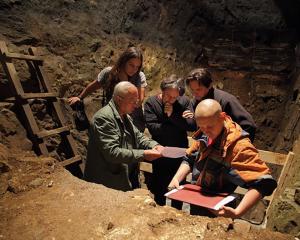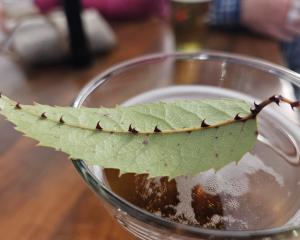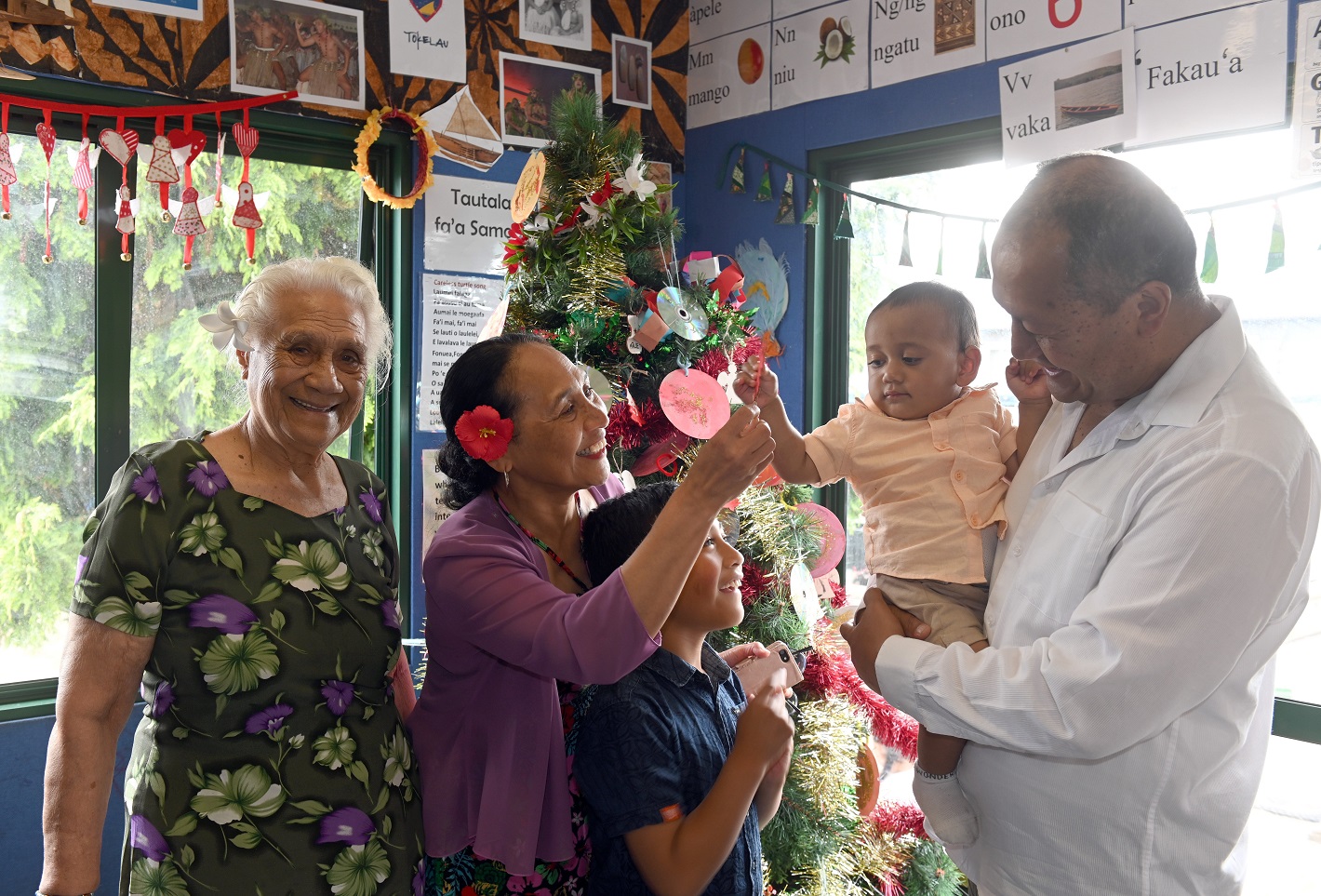
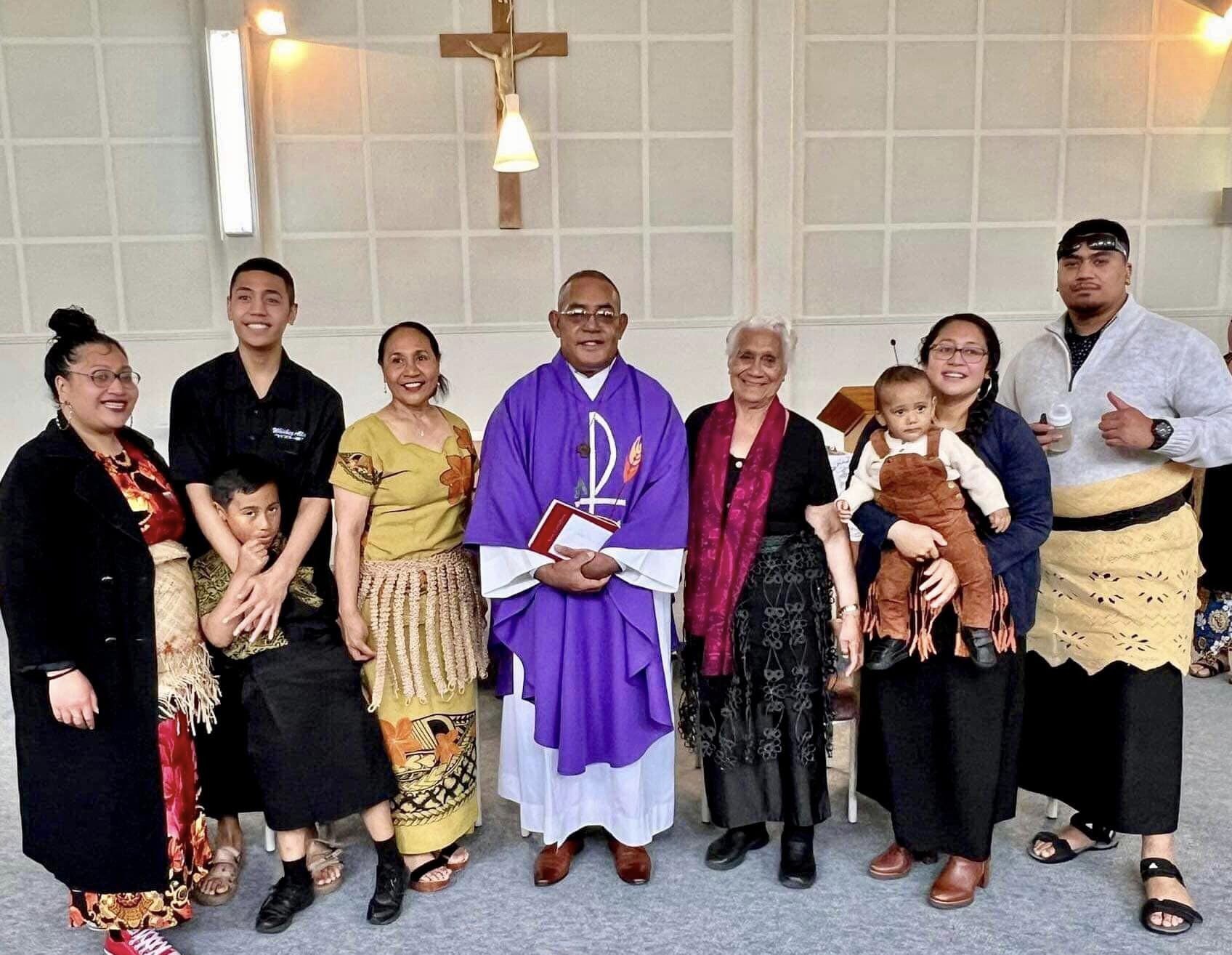
FINAU TAUNGAPEAU (TONGA)
Christmas is a special time for my family, marked by a deep sense of togetherness, community and celebration. It holds great significance as we come together to commemorate the birth of Jesus Christ, with attending church being our top priority.
Normally, after mass at St Mary’s, Kaikorai, the focus shifts to preparing a feast for our extended family pot luck, sometimes with up to 30 participants.
The gathering is characterised by the sharing of food, engaging in talanoa, playing games, dancing and simply enjoying each other’s company, usually singing Christmas songs and just catching up. It’s a joyous occasion filled with laughter and happiness, where different generations mingle harmoniously.
Children play together, youths have their own party, and the older generation catches up while dancing. I have two young grandchildren, aged 7 and 13 months, so we will unwrap presents in the morning for them.
We usually eat roast pork (usually roast pig for the extended family gatherings), taro and raw fish, and more Tongan traditional meals.
However, this Christmas our celebration will take on a quieter tone. After attending mass, our family of 11, which includes my husband, my mum, four adult children, a son-in-law, two grandsons and my younger brother visiting from Tonga, will share a meal together at home.
Then we’ll head to the airport to bid farewell to my brother as he returns to Tonga.
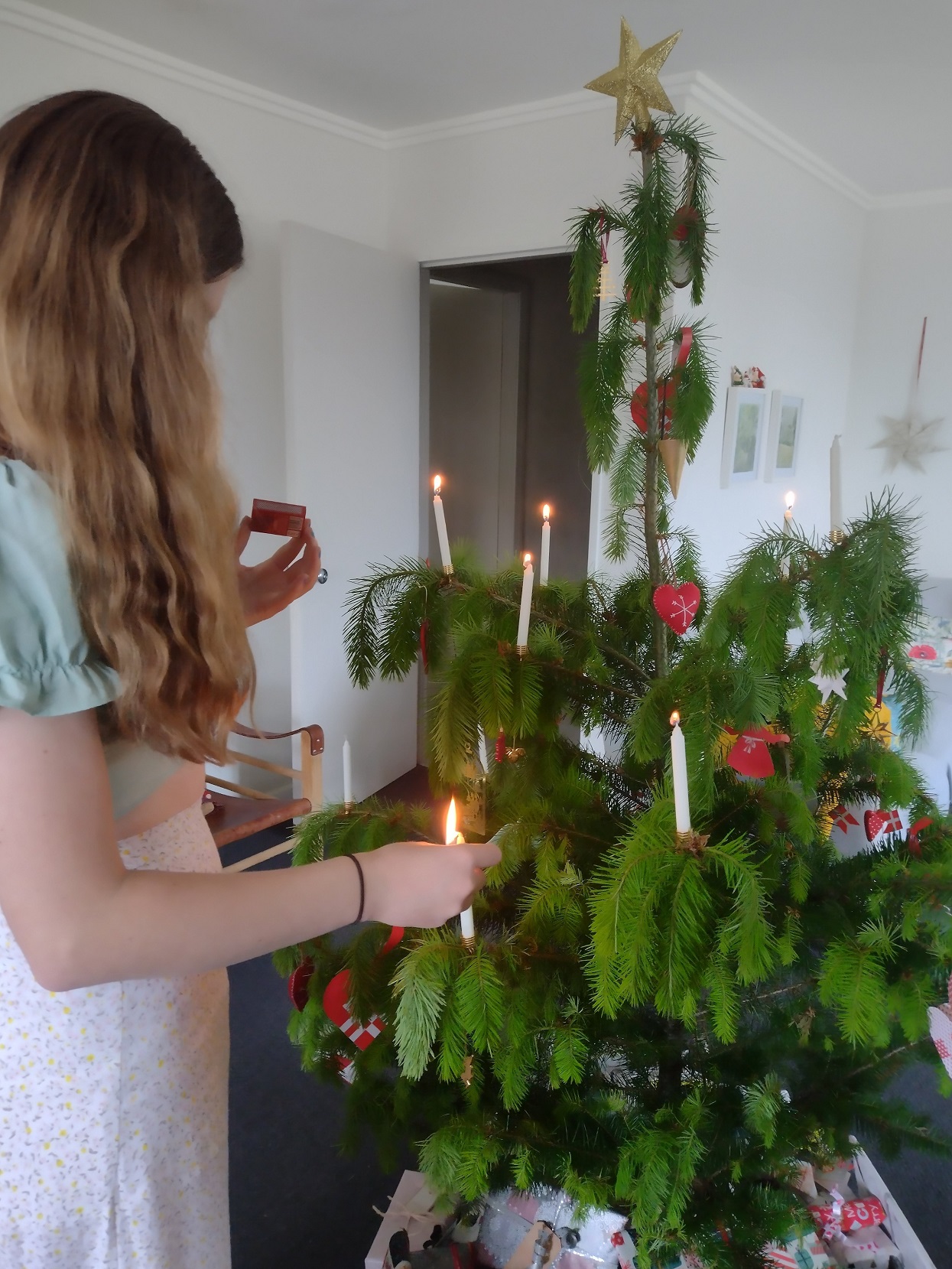
SOPHIA GOODIN (DENMARK)
We always celebrate Christmas on the evening of December 24. When it finally gets dark enough, just after 9pm, we light the candles and draw the curtains.
As Danes we like to imagine that our Christmas takes place when the weather is cold and dark, like it is in Scandinavia, in order to ‘hygge’ (generate that cosy feeling) with candles and the fire going.
We set up our live Christmas tree a couple of days before Christmas and decorate it with many traditional Danish decorations, such as handmade Christmas paper hearts, Danish flags and special candle holders with long candlesticks. On the 24th, we bring out the presents and put them under the tree in the afternoon.
Our Christmas dinner consists of a roast duck, caramelised potatoes, a grape and walnut salad and cooked red cabbage.

In the rice pudding there is one whole almond, and the game is to get the almond without making it too obvious to the other guests. The person who gets the whole almond are then presented with a small "almond present". It can get a little competitive at times, but this is one of the things during our Christmas that we all look forward to every year.
After dinner (and the dishes), we light the candles on the tree, holding hands in a circle and walking around the Christmas tree singing Danish Christmas songs and some of the classic Kiwi ones.
There is one Danish song in particular [Nu er det jul igen] where we end up running and dancing around the living room holding hands, which brings so much joy to us while we sing the song. This wears us out, meaning it’s time to sit down and open the presents. We also put out a small platter of sweets such as chocolates, traditional Danish biscuits and special home-made chocolate-covered marzipan with almonds on top.
The youngest in our family goes up to the tree and picks the first present, and the person whose present it is opens it in front of everyone. Then that person goes up and picks the next present. This way we are able to take our time watching each other open our presents and really enjoy Christmas.
We do have a pretty special Christmas."

BOZENA (BO) HAUG (POLAND)
St Nicholas visits the children on December 6 and hands out sweets and small gifts. On most people’s wish lists in Poland, especially children’s, is having a white Christmas.
Christmas — Boze Narodzenie, literally meaning "Christ Birth" — is celebrated with family and extended relatives. Anyone needing a refuge from the outside chill who knocks on your door or someone feeling lonely would be invited to join the family for Wigilia, the Christmas Eve meal.
There is a custom of placing an extra chair and setting an extra plate at the table for an unexpected guest. Polish hospitality is legendary. A Polish proverb equates having guests with having been blessed with the presence of God’s grace.
Twelve dishes are prepared for Wigilia. Fish is king, and is prepared in various ways: pickled, baked, set in a savoury jelly, or served with sour cream sauce with dill or horse radish.
Wigilia starts with sharing the wafer, oplatek, a symbol of forgiveness. Usually, the oldest family member or the matriarch starts the proceedings and shares the wafer with all the revellers, who in turn exchange holiday well wishes with each other. The wafer was also shared with farm animals in rural families.
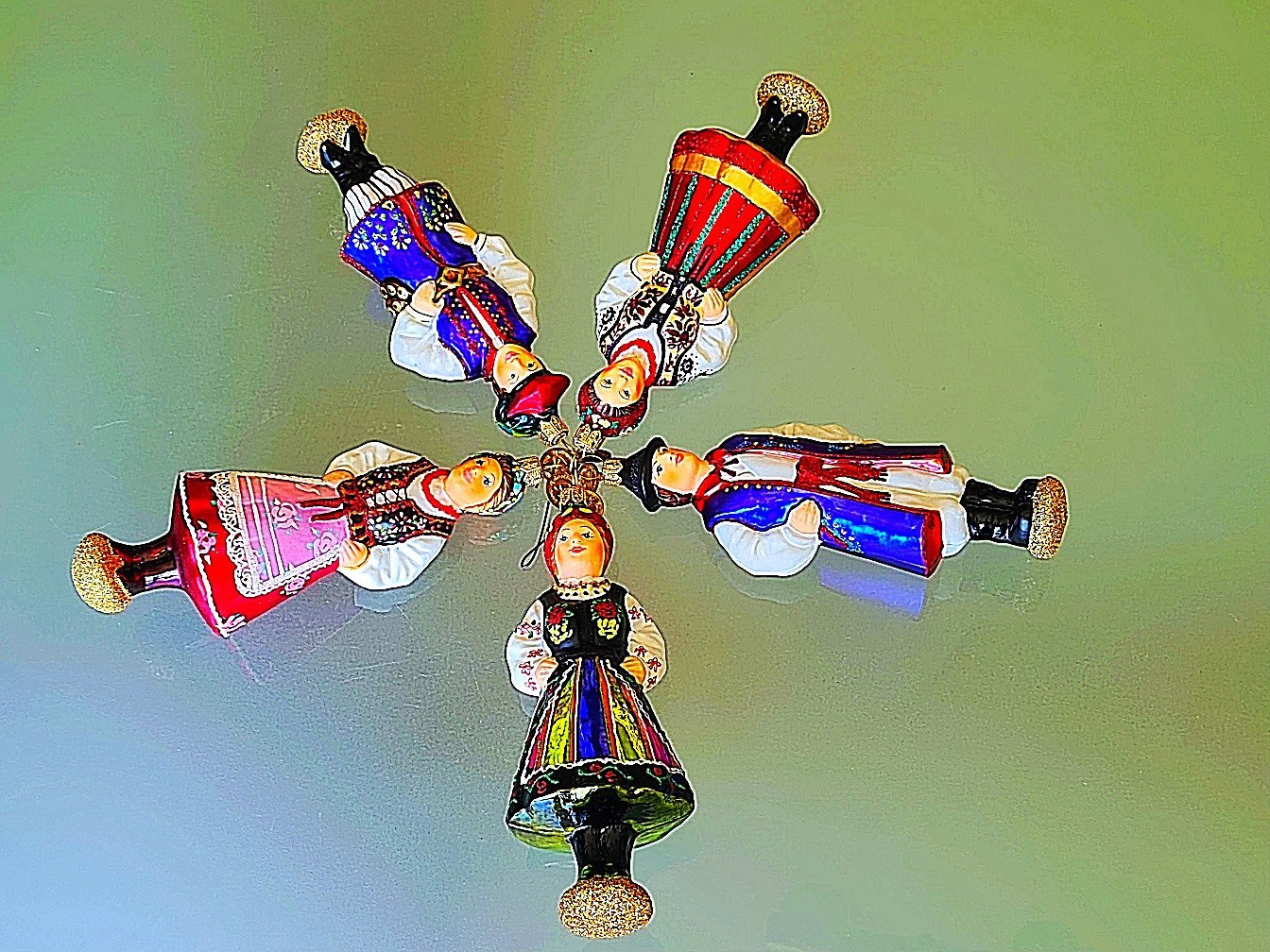
Family members have their own favourites — potato and cheese or cabbage and mushrooms being the most popular fillings. In our home, angel wings were made on New Year’s Eve but other Poles in Dunedin have told me that these light crispy delights were eaten at Christmas-time in their homes.
It’s customary to open presents on Christmas Eve. However, Lisa, of Polish descent, recalled that her father and uncle, as children, got theirs on Christmas Day, when all the relatives gathered at their home. A big Christmas Eve surprise for them was a live spruce tree, well hidden from children and brought inside already fully decorated, just before the start of the evening meal.
Anna, another Polish descendant and the oldest child in her family, recalls joining her father in a search for that perfect Christmas trees, while the younger siblings were being tucked into beds.
Czesia of Pahiatua made typical Polish paper, straw and yarn tree decorations for years. While her fingers were still nimble, she showed many New Zealand schoolchildren in the region how to make them.
I remember real candles in clip-on metal holders being used on the tree in my grandparents’ home. They would weigh the thinner branches down, and one had to remain vigilant that they didn’t cause a fire.
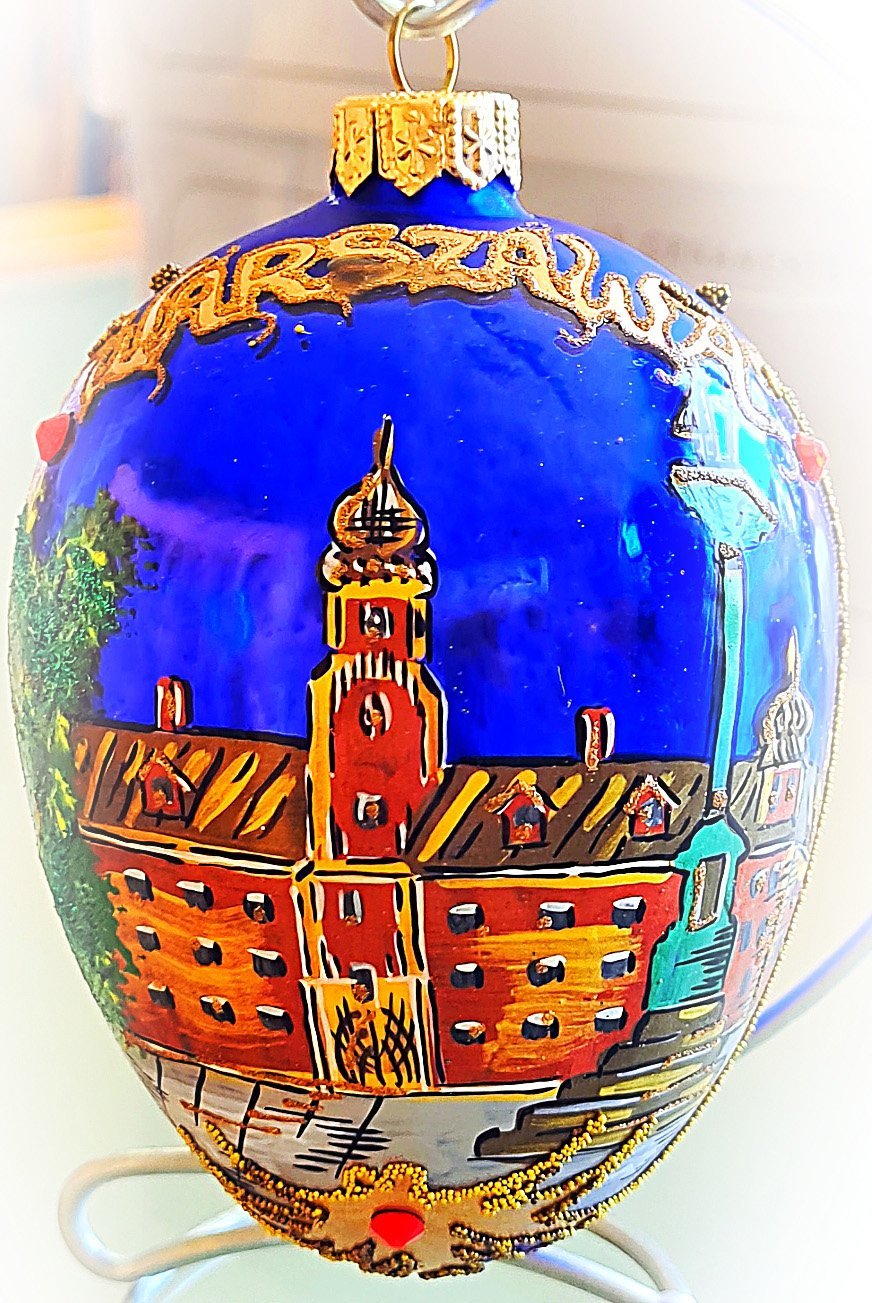
Ask who brings the gifts on Christmas Eve and you will get many answers — St Nicholas, Baby Jesus, angels, or a star-bearer, in Polish Gwiazdor. While Santa has become a globally recognised symbol, the Polish St Nicholas used to wear a mitre-shaped hat.
Some customs, for example waiting for the appearance of the first star, a signal for the celebrations to begin, are quite impractical during the southern hemisphere summer. Other customs are given up for convenience but even an artificial tree, when fully lit, can evoke the childhood wonders and magic of the Christmas season, which lasts in Poland until January 6.
Not all my Christmases were white. Yet, heading to midnight mass reminds me of the crunching sounds of glittering snow from my childhood years in Warsaw.
Nevertheless, a Christmas Day walk on any of Dunedin’s crystalline sparkling sand beaches evokes in me the same feeling of wonder. The thought that the family in Poland will look at the sky, too, brings us all closer together (with a bit of help from internet connectivity magic).
It’s more baffling talking to my Polish cousins in Canada. While they are just about to commence Wigilia, we are finishing our Christmas Day supper in Dunedin. The time difference is only 3 hours but Vancouver is a full day behind.
Wesolych Swiat.

CARTHIKA LUXMANAN (TAMIL COMMUNITY)
Dunedin is home to a small but active group of Tamil speakers, who hail from different countries such as India, Sri Lanka, Malaysia and Singapore, and have differing cultural and religious beliefs.
The Dunedin Tamil Society (DTS) connects Tamils in Dunedin and Otago by celebrating festivals throughout the year, such as Deepawali (festival of light), Eid, Christmas and Thai Pongal (the harvest festival).
Christmas is a particularly fun time for our community. Christmas in Aotearoa is synonymous with the end of school and sunshine, and in keeping with the Kiwi traditions, many Tamil families hold get-togethers with friends and family over meals.
The Dunedin Tamil community includes many Christians, for whom Christmas holds additional and perhaps more traditional meaning, with our Christian Tamil friends taking the time to attend church.

The 10 overs-a-side cricket game, and the lime-and-spoon racing are two of the popular games. While this is happening, some of the adults get the barbecue going to cook up an array of vegetables and meat, catering for all.
The array of delicacies at the potluck along with the barbecue are a treat not to be missed, and include items like lamb biryani, fish cutlets, chicken curry, caramel pudding, jelly and ice cream.
After the meal, Santa often makes an appearance to hand out gifts to the kids attending. Some years, the society has handed out awards for our "local heroes", such as kids performing in organised cricket.
The society is particularly interested in connecting with and supporting Tamils who may be living alone. Festivals can be difficult for those living alone, away from family and friends and potentially in a new environment, and our community events are important for everyone to feel included and celebrate.
The community is particularly proud of its culture of "virunthombal" or hospitality. Our Christmas gathering and others allows Tamils to meet, sparks conversations and ideas and plan future events, all integral for harmony in our community."








